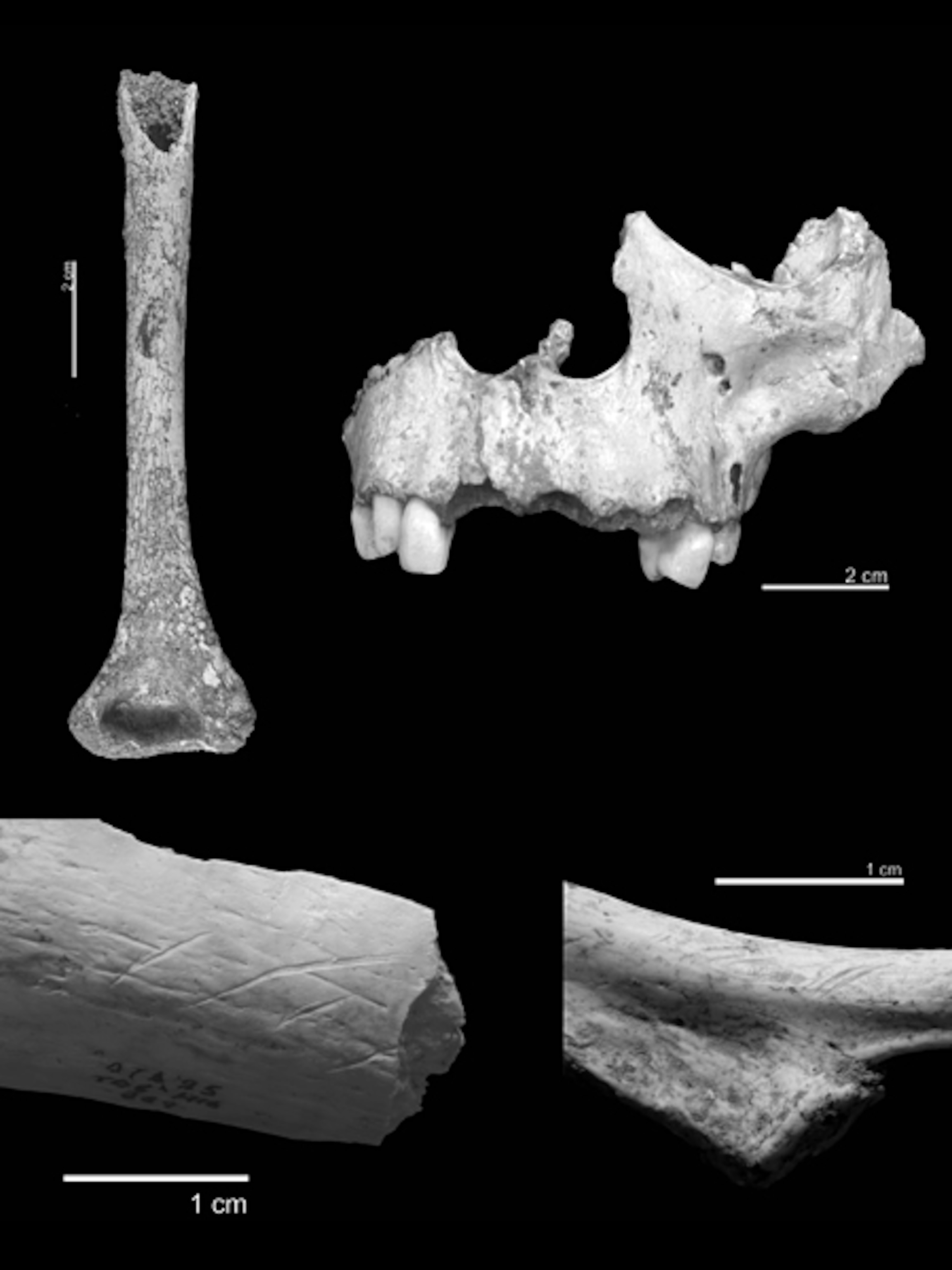
Human Meat Just Another Meal for Early Europeans?
Cannibalism helped meet protein needs, keep rivals in line, study suggests.
For some European cavemen, human meat wasn't a ritual delicacy or a food of last resort but an everyday meal, according to a new study of fossil bones found in Spain.
And, it seems, everyone in the area was doing it, making the discovery "the oldest example of cultural cannibalism known to date," the study says.
The 800,000-year-old butchered bones from the cave, called Gran Dolina, indicate cannibalism was rife among members of western Europe's first known human species, Homo antecessor.
The fossil bones, collected since 1994, reveal that "gastronomic cannibalism" was commonplace and habitual—both to meet nutritional needs and to kill off local competition, according to the study, published in the August issue of Current Anthropology.
(Also see "Neanderthals Turned to Cannibalism, Bone Cave Suggests.")
Cannibals Gave New Meaning to "Brain Food"
The cannibalism findings are based on leftover bones bearing telltale cut and impact marks, apparently from stone tools used to prepare the cave meals.
The butchered remains of at least 11 humans were found mixed up with those of bison, deer, wild sheep, and other animals, said study co-author José Maria Bermúdez de Castro.
As well as de-fleshing marks and evidence of bone smashing to get at the marrow inside, there are signs the victims also had their brains eaten.
Cuts and strikes on the temporal bone at the base of skull indicate decapitation, said Bermúdez de Castro, of the National Research Center on Human Evolution in Burgos, Spain.
"Probably then they cut the skull for extracting the brain," he added. "The brain is good for food."
(Related: "Druids Committed Human Sacrifice, Cannibalism?")
Human: It's What's for Dinner?
Because human and animal remains were tossed away together, the researchers speculate that cannibalism had no special ritual role linked to religious beliefs.
Nor was human meat an emergency food consumed only in lean times, Bermúdez de Castro said.
Cannibalized human bones were found in cave layers spanning a period of around a hundred thousand years, suggesting the practice was fairly consistent, according to the study.
Furthermore, the European cannibals should have had little reason for hunger.
The surrounding Sierra de Atapuerca region (regional map) would have been a "fantastic" habitat for early humans, with plenty of food and water as well as a mild climate, he said.
(See a picture of a "cannibal fork.")
Cannibals Preferred Fresh Meat?
Humans attracted to Sierra de Atapuerca would have fought over the fertile territory—and cannibalism would have been a good way of dealing with the competition, Bermúdez de Castro said.
But it might not have resulted in the fairest of fights—the 11 cannibalized individuals discovered so far were all children or adolescents.
Targeting youngsters who were less able to defend themselves "posed a lower risk for hunters" and "would have been effective in the strategy of controlling competitors," according to the study.
Cannibalism Widespread for Early Humans?
Paleontologist Silvia Bello agreed that "the distribution of [impact] and cut marks and the similarity of signs on humans and nonhuman remains make the hypothesis of cannibalism for this site likely."
The evidence that cannibalism "was a common, functional activity, not directly related to food stress or ritualistic behavior" is also convincing, said Bello, of the Natural History Museum in London.
However, she added, it's hard to be sure whether the cannibals were eating individuals from their own group or outsiders.
Anthropologist Peter Andrews also backs the team's interpretation, with caveats.
"It appears that cannibalism was widespread during much of human evolution, and it is likely that it may have been even more widespread than present evidence indicates, for some early work on [human ancestor] sites may have failed to identify the evidence for cannibalism," Andrews, formerly head of human-origins studies at the Natural History Museum, said in an email.
Nevertheless, he added, "we still have no way of knowing whether cannibalism was habitual or restricted to periods of stress, for time scales in archaeological sites are usually not fine enough to distinguish them."
To truly be able to identify part-time vs. regular cannibalism, Andrews said, "you would need evidence on a time scale of less than one year."